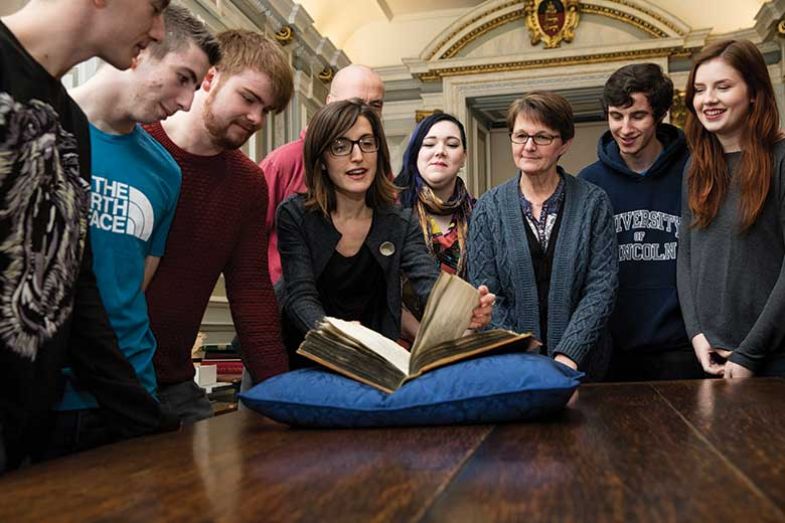
Named Modern University of the Year in 2021, the University of Lincoln fosters innovative approaches to teaching and a culture of collaboration and inclusion
The University of Lincoln is one of the largest employers in the historic cathedral city, with more than 2,000 professional and academic staff occupying a range of roles. It is a fast-growing university – rated gold in the teaching excellence framework (TEF) – and it embraces a forward-looking style of leadership with an emphasis on partnership and collaboration.
In 2021, Lincoln was named Modern University of the Year in The Times and Sunday Times Good University Guide, having grown and evolved rapidly since adopting its current structure in 2001. It was also named one of the top institutions in the Times Higher Education Young University Rankings and has received a five-star rating from the QS World University Rankings. Lincoln attracts regular praise for its partnerships with employers – including Siemens, Thomson Reuters and Microsoft – as well as its industry-friendly facilities. Last year, it opened a purpose-built medical school, in conjunction with the University of Nottingham, that each year will train more than 400 undergraduate medical students.
Dr Kate Strudwick, dean of the Lincoln Academy of Learning and Teaching (LALT), speaks from experience when she says the university offers a warm and inclusive welcome – she has worked there for 23 years. “What has made it great here for me is the way the university is supportive of all and enhances everyone’s potential,” she says. “Our One Community ethos shows how the university values collegiate behaviour, supports employees with upskilling, and respects the route you want to take with your career.” Roles at the university offer a generous benefits package, and Lincoln cultivates a culture of ambition where both academic and professional services staff are encouraged to flourish, supported by an extensive learning and development programme.
The One Community ethos at Lincoln encompasses equality, understanding, listening, kindness and acceptance. There are events throughout the year that celebrate these values, welcoming guest speakers from a variety of backgrounds so staff and students can broaden their experiences and learn from one another.
Whichever route academics choose – teaching and research or teaching, scholarship and professional practice – there is targeted continuous professional development to support this.
Rhianne-Ebony Sterling-Morris has been a member of staff at Lincoln for almost two years. The level of consultation and collaboration between the university and her student engagement team has been impressive, she says. “If we can keep students engaged, they can accomplish something bigger than themselves,” she says. As senior research officer for the Lincoln Equality Attainment Project (LEAP), her focus is on creating equality of attainment.
Sterling-Morris and her colleague Xiaotong Zhu created the Race Equality Student Advisory Group at Lincoln in order to help students engage with race equality work across the university. As part of their work, Sterling-Morris and Zhu developed the Lincoln Education Toolkit for Student Success, which aims to empower staff to better support students from black, Asian and minority ethnic backgrounds.
Equality, diversity and inclusion are all part of the One Community ethos, Sterling-Morris explains. “Lincoln has been on a journey with equality, diversity and inclusion, and it’s getting bigger and involving more students,” she adds. “It’s been fantastic engaging with students and using their insights to propel initiatives.”
There are a number of support groups for employees, including the Staff Disabilities Network, an LGBTIQ+ and allies network, and a people of colour network. Strudwick explains that the university is “diverse in an international sense, with many different cohorts working as one”. She adds: “Projects such as LEAP ensure that everyone is given the opportunity to flourish, and if there is a difference in attainment between different groups, it’s our job to ask why. It’s the same with student engagement; we evaluate and follow up. These can be difficult questions to ask, but we must do so.”

LALT itself exists separately from schools and colleges at the university, acting as a supportive resource for all involved in teaching. Lincoln’s “student as producer” approach to teaching and learning sits at the heart of this, offering tailored opportunities for students to get involved in research and take ownership of their learning journey. Recruits receive a robust induction into these key principles when they join.
Strudwick credits Lincoln’s student-led approach with the university’s ascension in the university rankings and its recognition as Modern University of the Year. “We’ve seen a consistent rise in student numbers and high-quality links with industry, but it’s also in the way we’ve responded to challenges from the outside. We have a long-standing reputation for facilitating students to engage not only with their curriculum but outside it, too,” she adds. One example is the partnership between the Students’ Union and LALT, which encourages students to get involved with research projects outside their discipline.
Receiving the gold rating for teaching quality in the TEF in 2017 was recognition of Lincoln’s commitment to teaching quality, its learning environment and its high levels of student engagement. The judging panel highlighted how the university recognises and rewards excellent teaching and the way it monitors and personalises learning for its students.
Lincoln also plays an important role in the community, having signed up to the Civic University Agreements, which outline how institutions can fulfil their responsibilities to the locations in which they are based. “Where we sit is hugely important,” explains Strudwick. “We see a partnership approach with local employers and across disciplines – the relationship very much goes both ways.” The university participates in local events such as the Lincoln Book Festival and hosts free public lectures.
For Sterling-Morris, the embodiment of the One Community ethos at Lincoln has been the way her colleagues welcomed her to the role, upholding a culture of respect at all times. “Everyone has been open and willing to hear and understand my point of view,” she concludes. “The university listens to all members of staff at all levels, and that’s what makes it stand out.”
Find out more about the University of Lincoln.
